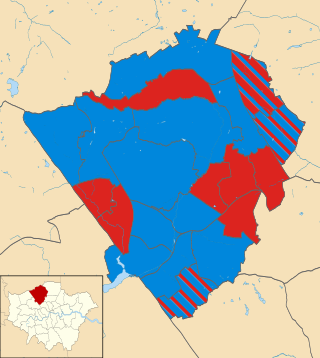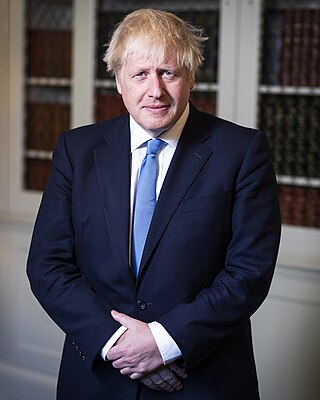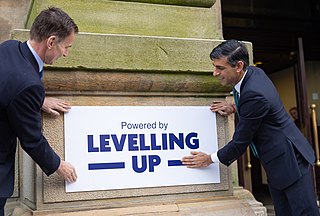The Conservative and Unionist Party, commonly the Conservative Party and colloquially known as the Tories, is one of the two main political parties in the United Kingdom, along with the Labour Party. The party sits on the centre-right to right-wing of the political spectrum. Following defeat by Labour in the 2024 general election, it is currently the second largest political party by the number of votes cast and number of seats in the House of Commons, followed by the Liberal Democrats. As the second largest party, it has the formal parliamentary role of the Official Opposition. It encompasses various ideological factions including one-nation conservatives, Thatcherites, and traditionalist conservatives. There have been twenty Conservative prime ministers. The party traditionally holds the annual Conservative Party Conference during party conference season, at which senior Conservative figures promote party policy.

Alexander Boris de Pfeffel Johnson is a British politician and writer who served as prime minister of the United Kingdom and leader of the Conservative Party from 2019 to 2022. He was previously foreign secretary from 2016 to 2018 and mayor of London from 2008 to 2016. He was the member of parliament (MP) for Henley from 2001 to 2008 and for Uxbridge and South Ruislip from 2015 to 2023.

Get Britain Out is a United Kingdom-based independent cross-party grassroots Eurosceptic group which campaigned for the United Kingdom to leave the European Union. The campaign is still in operation and is pushing for the UK to break away from continued alignment with the European Union.

Phillip James Lee is a British doctor and politician who served as the Member of Parliament (MP) for Bracknell from 2010 until 2019. A former member of the Conservative Party, which he left in 2019 to join the Liberal Democrats, he unsuccessfully stood for the neighbouring Wokingham constituency in the 2019 general election.

The Fixed-term Parliaments Act 2011 (FTPA) was an Act of the Parliament of the United Kingdom which, for the first time, set in legislation a default fixed election date for general elections in the United Kingdom. It remained in force until 2022, when it was repealed. Since then, as before its passage, elections are required by law to be held at least once every five years, but can be called earlier if the prime minister advises the monarch to exercise the royal prerogative to do so. Prime ministers have often employed this mechanism to call an election before the end of their five-year term, sometimes fairly early in it. Critics have said this gives an unfair advantage to the incumbent prime minister, allowing them to call a general election at a time that suits them electorally. While it was in force, the FTPA removed this longstanding power of the prime minister.

Brexit was the withdrawal of the United Kingdom from the European Union.

Christopher Patrick James Green is a British Conservative Party politician who served as the Member of Parliament (MP) for Bolton West from 2015 until 2024. He was re-elected in 2017 and 2019, increasing his majority and vote share at both general elections. He lost the seat in the 2024 general election.

The 2019 United Kingdom general election was held on Thursday 12 December 2019, with 47,074,800 registered voters entitled to vote to elect 650 Members of Parliament (MPs) to the House of Commons. The governing Conservative Party, led by Prime Minister Boris Johnson, won a landslide victory with a majority of 80 seats, a net gain of 48, on 43.6 per cent of the popular vote, the highest percentage for any party since the 1979 general election, though with a narrower popular vote margin than that achieved by the Labour Party over the Conservatives at the 1997 general election. This was the second national election to be held in 2019 in the United Kingdom, the first being the 2019 European Parliament election.

The 2019 Conservative Party leadership election was triggered when Theresa May announced on 24 May 2019 that she would resign as leader of the Conservative Party on 7 June and as Prime Minister of the United Kingdom once a successor had been elected. Nominations opened on 10 June; 10 candidates were nominated. The first ballot of members of Parliament (MPs) took place on 13 June, with exhaustive ballots of MPs also taking place on 18, 19 and 20 June, reducing the candidates to two. The general membership of the party elected the leader by postal ballot; the result was announced on 23 July, with Boris Johnson being elected with almost twice as many votes as his opponent Jeremy Hunt.

The 2018 Barnet Borough Council election took place on 3 May 2018 to elect members of Barnet Borough Council in England. It took place on the same day as other local elections in 2018. In the last election, the Conservatives won control of the council with 32 seats, compared to 30 for Labour and 1 for the Liberal Democrats. On 15 March 2018, following the resignation of a Conservative councillor, the council was in a state of no overall control. The election on 3 May 2018 saw the Conservatives take back overall control with a majority of 13.

The impact of Brexit on the Irish border and its adjacent polities involves changes in trade, customs, immigration checks, local economies, services, recognition of qualifications, medical cooperation, and other matters, as it is the only land border between the United Kingdom and the European Union.
The Irish backstop was a proposed protocol to a draft Brexit withdrawal agreement that never came into force. It was developed by the May government and the European Commission in December 2017 and finalised in November 2018, and aimed to prevent an evident border between the Republic of Ireland and Northern Ireland after Brexit.

Reform UK, formerly the Brexit Party and colloquially known as Reform, is a right-wing populist political party in the United Kingdom. Nigel Farage has served as the party's leader since June 2024 and Richard Tice has served as the party's deputy leader since July 2024. The party currently has five members of Parliament (MPs) in the House of Commons and one member of the London Assembly. The party also holds representation at the local government level, with most of its local councillors having defected from the Conservative Party to Reform UK. Following Farage's resumption of the leadership during the 2024 general election, there was a sharp increase in support for the party. Following the election, it was the third largest party by popular vote, with 4,117,610 votes achieving 14.3 per cent of the vote in total.
Brexit was the withdrawal of the United Kingdom from the European Union at 23:00 GMT on 31 January 2020. As of 2020, the UK is the only member state to have left the EU. Britain entered the predecessor to the EU, the European Communities (EC), on 1 January 1973. Following this, Eurosceptic groups grew in popularity in the UK, opposing aspects of both the EC and the EU. As Euroscepticism increased during the early 2010s, Prime Minister David Cameron delivered a speech in January 2013 at Bloomberg London, in which he called for reform of the EU and promised an in–out referendum on the UK's membership if the Conservative Party won a majority at the 2015 general election. The Conservatives won 330 seats at the election, giving Cameron a majority of 12, and a bill to hold a referendum was introduced to Parliament that month.

A by-election was held in the UK Parliament constituency of Brecon and Radnorshire on 1 August 2019 after Chris Davies, who had held the seat for the Conservatives since the 2015 general election, was unseated by a recall petition. The by-election was won by Jane Dodds of the Liberal Democrats.

Boris Johnson's tenure as Prime Minister of the United Kingdom began on 24 July 2019 when he accepted an invitation of Queen Elizabeth II to form a government, succeeding Theresa May, and ended on 6 September 2022 upon his resignation. Johnson's premiership was dominated by Brexit, the COVID-19 pandemic, the Russian invasion of Ukraine, and the cost of living crisis. As prime minister, Johnson also served simultaneously as First Lord of the Treasury, Minister for the Civil Service, Minister for the Union, and Leader of the Conservative Party.
On 3 September 2019, the British Conservative Party withdrew the whip from 21 of its MPs who had supported an emergency motion to allow the House of Commons to undertake proceedings on the European Union (Withdrawal) Bill on 4 September. In the hours after the vote, the Chief Whip Mark Spencer informed the rebel MPs that they were no longer entitled to sit as Conservatives. This led to the loss of the Conservative/DUP majority in the Commons.
2010s in United Kingdom history refers to significant political and societal historical events in the United Kingdom in the 2010s, presented as a historical overview in narrative format.

Get Brexit Done was a political slogan frequently used by the British Conservative Party and former Prime Minister Boris Johnson in the run up to the 2019 general election. The slogan reflected the party's pledge to, if re-elected, facilitate the United Kingdom's withdrawal from the European Union by the end of January the following year.

"Levelling up" was a political policy first articulated in the 2019 Conservative Party manifesto that aims to reduce the imbalances, primarily economic, between areas and social groups across the United Kingdom. It seeks to do so without acting to the detriment of prosperous areas, such as much of South East England. A white paper for the policy was published by Boris Johnson's government on 2 February 2022, and was continued by Rishi Sunak's government. The policy was overseen by the Department for Levelling Up, Housing and Communities.

















